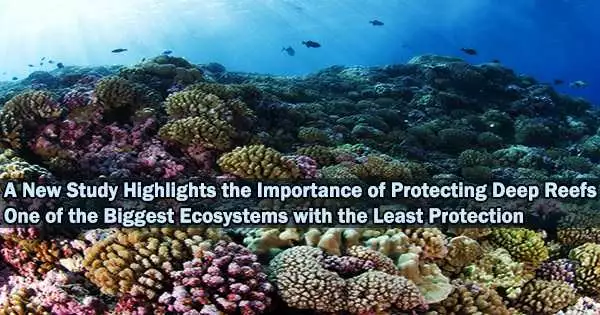An international team of marine scientists and conservationists have made a passionate case for the urgent conservation of deep reefs as world leaders, government negotiators, scientists, and conservationists convene at the UN Biodiversity Conference, COP15, to commit to stop and reverse the natural loss.
Their requests are supported by a recent study that was conducted by researchers from Nekton, the Western Indian Ocean (WIO), and the University of Oxford and recently published in the journal Conservation Letters. This demonstrates for the first time that despite being threatened by numerous stressors, including as overfishing, pollution, climate change, and, in the near future, seabed mining, deep reef habitats, particularly in the WIO, are mostly unprotected.
Their demands come after the COP27 in Egypt, where a large number of scientists, policymakers, and activists came to the conclusion that the 1.5C climate objective was dead, thereby signing the death certificate for the great majority of shallow reefs.
Deep reefs (found below 30 m) offer crucial ecosystem services for resiliency to climate change, the health of the ocean, and food security. They also serve as a refuge for organisms imperiled in shallow water, such as species with significant economic value. Despite having a broader geographic footprint than their shallower counterparts, deep reefs are hardly protected.
Additionally, coastal communities that depend on fish for their food security are increasingly exploiting deep reefs due to the lack of fish in shallow waters and advancements in deep-sea fishing technology.
“We strongly encourage deep reefs to be included in conservation and sustainable management action to complement global targets, notably 30% protection of the global ocean by 2030,” said the study’s lead author, Dr. Paris Stefanoudis, a marine biologist at the University of Oxford’s Department of Biology and a Research Scientist at Nekton. “Deep reefs are critical to a healthy marine ecosystem and face similar threats from overfishing, pollution, and climate change faced by the much-imperilled shallow reef system.”
To halt and reverse nature loss, the UN Biodiversity Conference, COP15 must prioritise the conservation of unique ecosystems such as deep reefs, one of the least protected ecosystems on Earth. We hope our recommendations and actions will be useful for decision-makers in the WIO, be applied within the new Western Indian Ocean regional policy, and provide the springboard for deep reefs to become protected across the global ocean.
Professor Lucy Woodall
The Western Indian Ocean, which makes up more than 8% of the world’s oceans, is one of the least well-known, least well-protected, and most imperiled marine ecosystems on the globe. The WIO’s shallow and deep coral reefs are hotspots for marine biodiversity because they are home to a large number of species that are unique to our planet.
They are crucial for the 100 million people who reside within 100 kilometers of the shore in the area, including the roughly three million people whose livelihoods directly depend on artisanal fishing. Over the next 30 years, it is expected that the population will double, placing further strain on the ocean’s biological ability to sustain life.
The scientific team has collaborated on the development of a new framework for the conservation of deep reefs, which includes useful advice and specific recommendations for local policy-makers, environmentalists, and scientists. This has been published in the journal Conservation Letters.
The researchers urge policy makers to use the COP15 summit to agree to the following:
- Highly protect 30% of ecosystems by 2030 (’30 by 30′), and include deep reefs in this target.
- By specifically include them in fisheries rules, marine protected areas, and marine spatial planning, deep reef ecosystems, and their resources can be preserved.
- Deep reefs should be included in current management initiatives for shallow reefs because these ecosystems are frequently interconnected.
- Invest in fundamental, foundational, and applied research on the biodiversity of deep reefs, the operation of ecosystems, and the services they provide.
- Develop national, international, and transnational cross-stakeholder collaborations to survey and conserve deep reefs in national and international (High Seas) waters
“To halt and reverse nature loss, the UN Biodiversity Conference, COP15 must prioritise the conservation of unique ecosystems such as deep reefs, one of the least protected ecosystems on Earth” stated co-author Professor Lucy Woodall, Professor of Marine Biology at the University of Oxford, Nekton Principal Scientist, “We hope our recommendations and actions will be useful for decision-makers in the WIO, be applied within the new Western Indian Ocean regional policy and provide the springboard for deep reefs to become protected across the global ocean,” continued Professor Woodall.
Co-author Melita Samoilys, CORDIO East Africa explains: “Our framework was jointly developed with a range of stakeholders from academia, research, management and government, and provides a list of actions across three themes: capacity, information collection, and information sharing. Given the scale of the issue, we have also identified which parties such as funding agencies, government, Institutions or the research community are needed to work together to realise those actions.”
“To ensure a prosperous and resilient Western Indian Ocean, it is essential that deep reefs are no longer ignored by scientists and policy makers, and they must be specifically considered in conservation and management strategies,” shared co-author Athur Tuda, Executive Director of the Western Indian Ocean Marine Science Association, WIOMSA.





